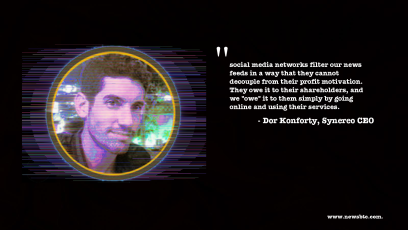Reason to trust

How Our News is Made
Strict editorial policy that focuses on accuracy, relevance, and impartiality
Ad discliamer
Morbi pretium leo et nisl aliquam mollis. Quisque arcu lorem, ultricies quis pellentesque nec, ullamcorper eu odio.
Synereo is the up-and-coming decentralized Facebook replacement. NewsBTC’s Andrew Wagner got the chance to interview Synereo’s founder and CEO.
Andrew: how closely does Synereo follow the brain’s network model? Does it attempt to replicate specific neural processes–like, are nodes modeled after neurons?
Dor: For starters, Reo – our social consensus mechanism – is a learning mechanism. It lowers the amount of energy required to allow information to flow to where it’s needed by reducing entropy. It makes attention-giving a more efficient process by reducing the available amount of statistically “unworthy” options.
I.e. when information enters the system in Synereo, through a user, there are fewer pathways available for it to travel than through a similar user on a similar network without such a mechanism. The remaining options represent better routes for information to travel through and to.
In this sense, it greatly resembles what the brain does. Much of the functionality of the brain is in filtering; “closing the doors of perception” and keeping you sane and operational. Creating neuronal ensembles that serve as probability maps rather than simply reverberating everything they sense, tuning to specific information only, and conveying signals down learned pathways that they “know” from experience of positive/negative feedback.
Synereo’s basic peer to peer technology takes a hint from neural networks as well: each node on the network has a limited view of the network and communicates based on local activity only. That is to say, even if a message comes from afar, it only influences a specific node if the message is relayed through other nodes close to it on the network.
This is why we’ve elected to call our basic technological instrument the “DEndron”, after the neuronal dendrite. The function of dendrites in the brain is to integrate information coming from many neurons, processing it, and deciding how to pass it along – share it – next. All of our attention economy mechanics – Current, Rebroadcasting, Recharging, etc etc – are isomorphic to neuronal processes inside dendrites and throughout the nodes of the brain.
That makes sense. It’s well known that we’re only conscious of some small fraction of information our senses could access, and social media networks filter our news feeds in the same way.
Yes. However, social media networks filter our news feeds in a way that they cannot decouple from their profit motivation. They owe it to their shareholders, and we “owe” it to them simply by going online and using their services.
Let’s go back to your background for a minute. I heard there was some background in Isreali intelligence work among the Synereo team. Was that you? Decentralized applications are independent of their authors, of course, but Bitcoiners are prone to conspiracy theories.
Nope. That’s Andy. I served in the Israeli Air Force’s HQ, under some of the most self-entitled people in the universe.
I find these theories quite funny. All of our code is open and available for inspection, and all communications are encrypted peer to peer. There’s no possible vector of attack into a system like that, certainly not from its creators. Hell, once our client is available for use, we won’t even be able to know how many people are using it!
As the developers, your only possible incentive besides love of coding is the AMP presale then, yes? Do you think a lot of people are going to be into AMPlified content? If the option exists to turn it off, a lot of people might
Well, I could go on and on about why we’re doing this besides the love of coding. 🙂 However, I think a lot of people are going to play the AMP game. Keep in mind that even amplified content is going to be from companies, services and topics that are interesting to you or that are close to your or your friends’ fields of interest. This isn’t a situation where GloboChem farms Facebook’s Big Data and decides you’re the perfect candidate for a campaign you couldn’t care less about, injecting it into your online experience without you having any say in the matter.
We’re hoping that a lot of the amplified content is going to come from people who aren’t necessarily trying to shove some product down your throat. Friends wanting to increase the audience of their personal blogs, artists and content creators looking for exposure, event organizers wanting to reach out beyond their natural crowds, etc. AMPs are also Synereo’s mechanism for compensating people for publishing content they appreciate, don’t forget. You’ll often receive an AMPed post simply because your friend wanted to tip someone for creating it.
How long do you think it will be before our social media is fully decentralized, from posting content to sending private messages?
Our upcoming demo shows this functionality already in place, so… not very long! 😉



























